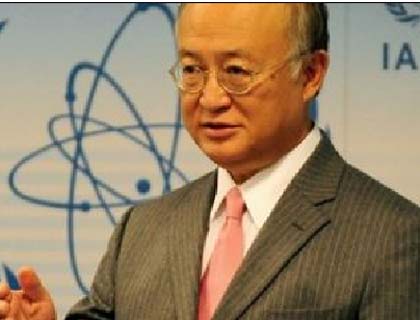VIENNA - U.N. nuclear chief Yukiya Amano is showing steely determination to confront Iran over suspected atomic bomb research that belies his diffident public persona, even if it angers powerful member states such as Russia. In doing so, Amano, head of the International Atomic Energy Agency, is likely to please the Western states which helped secure his job two years ago but may also draw accusations of pro-U.S. bias from those sympathetic to Iran.
This week's report by the U.N. nuclear watchdog, which offered its clearest case to date of military dimensions to Iran's nuclear program, underlined the veteran Japanese diplomat's no-nonsense approach to the sensitive issue.
The hard-hitting document also suggests differences in style between Amano, 64, and his predecessor Mohamed ElBaradei, who was regarded with deep suspicion by Washington and Tel Aviv.
ElBaradei, who ran the IAEA for 12 years and became a celebrity after winning the Nobel Peace Prize, was outspoken in his wariness of Western intelligence after erroneous reports were used by the United States to justify the 2003 Iraq war.
He also vocally opposed sanctions against Iran, arguing they would discourage, not spur, Iranian cooperation and turn into a slippery slope toward war. Washington and close allies accused him of improperly politicizing the IAEA.
By contrast, Amano in his previous job as Japanese ambassador to the IAEA shared the tough Western line on Iran and was not seared by bogus Iraq intelligence as ElBaradei was.
"Because of his Iraq experience ElBaradei was very, very worried that the IAEA reports would be used to justify military action," one nuclear analyst said, adding the Egyptian career diplomat had sought to help Iran "dig itself out of a hole."
"Amano hasn't had that experience and therefore his priority is not to find every possible way to get Iran to cooperate," the Vienna-based nuclear analyst added.
"There is definitely a difference of approach. Amano is more willing to be more blunt in the reports," one European diplomat accredited to the Vienna-based IAEA said.
The reaction to the report from the Jewish state and the Islamic Republic spoke volumes of how Amano, who took over after ElBaradei in late 2009 with the backing of Western states, and the U.N. agency are now seen by the two foes.
POLITICAL PRESSURES AT IAEA
"Why do you damage the agency's dignity because of America's invalid claims?" Iranian President Mahmoud Ahmadinejad said on state television, dismissing the report.
In contrast, an Israeli official with responsibilities for nuclear and intelligence affairs said: "Much of what appears in the IAEA report could have been published years ago, but ElBaradei buried it. Amano's a professional."
However, diplomats said Amano's report did not go as far as some Western countries might have liked in spelling out an assessment of whether Iran was actually seeking nuclear arms.
Amano insisted last December he was impartial in his work after leaked U.S. diplomatic cables said he agreed with the United States on key issues including Iran.
The IAEA document, which included an unusual 13-page annex with technical descriptions of weapons-relevant research and development, said Iran appears to have worked on designing an atomic bomb and may still be conducting secret research.
"It's very important and it should have come out earlier but there was a head of the organization that had a different view about it," said U.S. proliferation expert David Albright.
A Western diplomat said Amano had become increasingly frustrated by Iran's refusal to address his concerns.
"Amano thinks that the best role the IAEA can play is as a technical agency that is forthcoming about the information that it has," the diplomat said.
But signaling splits among big powers, Russia said the document's publication would dim hopes for dialogue with Tehran and could scuttle chances for a diplomatic solution. China had also lobbied against the release of the sensitive data.
By nature a reserved technocrat, Amano was narrowly elected as new director general of the 151-member IAEA with the backing of Western powers in a 2009 election race which highlighted a deep divide between industrialized and developing nations.
Developing states felt Amano was too close to a U.S.-led club of nuclear powers, including Japan, which they accuse of hoarding the technology for political and commercial reasons.
He quickly put his stamp on the agency's closely watched quarterly report on Iran's nuclear programme, moving away from ElBaradei's relative ambivalence and declaring he feared that Iran was working toward developing a nuclear missile. (Reuters)

